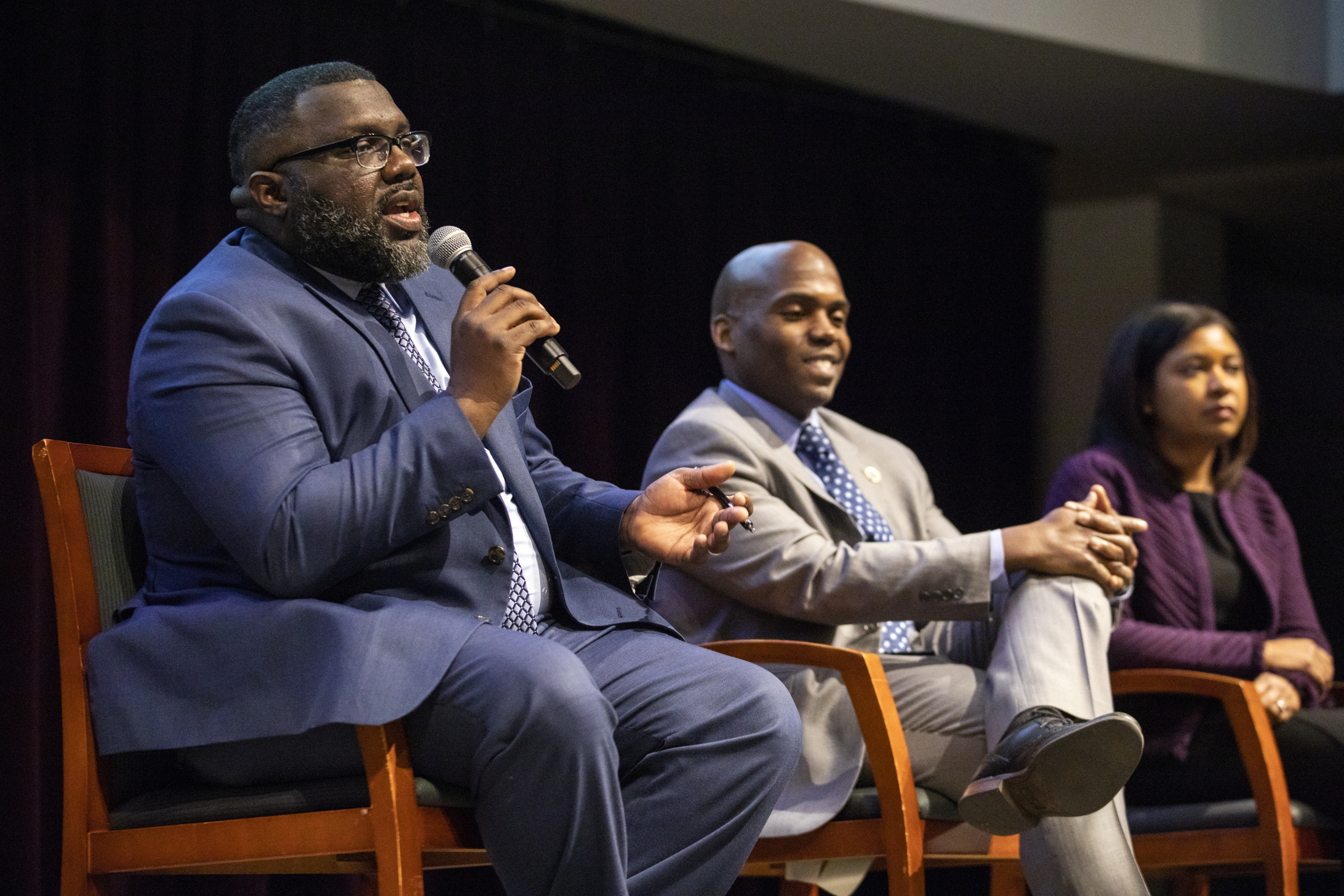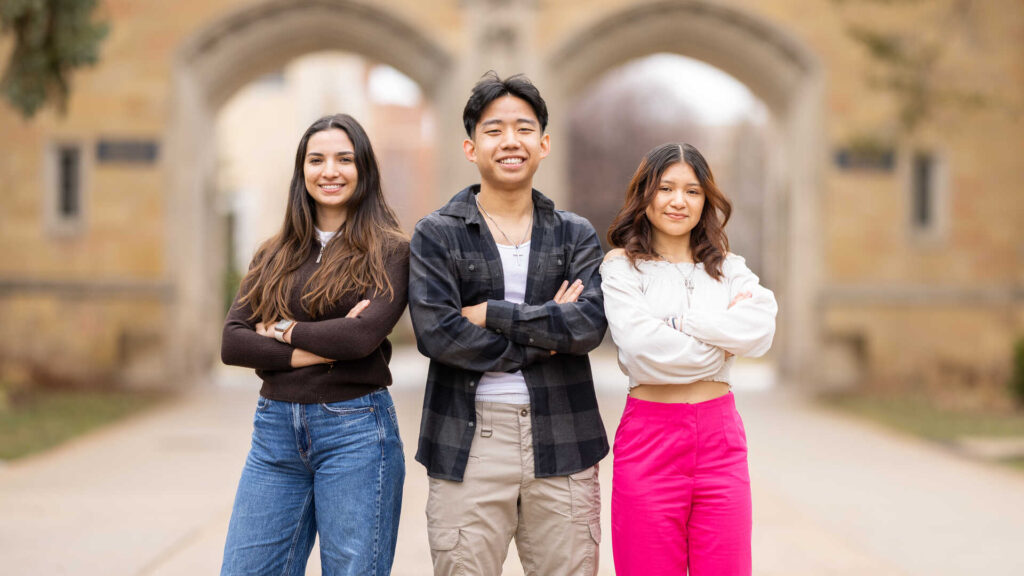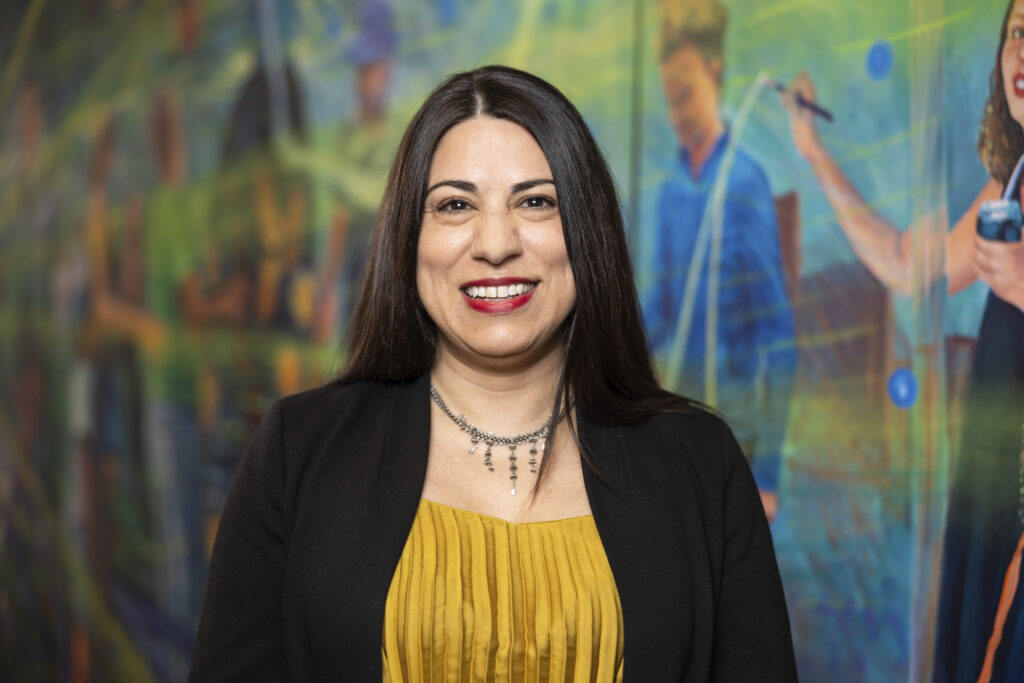More than 150 St. Thomas community members came together in O’Shaughnessy Educational Center auditorium Tuesday for the School of Education Dean’s Forum and College of Arts and Sciences Teach-in Tuesday joint presentation, “A Need for Black Historical Consciousness.”
School of Education Dean Kathlene Holmes Campbell, PhD, and College of Arts and Sciences Dean Yohuru Williams, PhD, welcomed guest speaker LaGarrett King, PhD, associate professor of social studies education and founding director for the CARTER Center for K-12 Black History Education at the University of Missouri-Columbia.
King introduced and examined the concept of black historical consciousness, explaining how the history we learn is naturally anti-black, which influences how we understand black people as a contemporary racialized group. He also spoke about potential solutions to this continuing reality in the United States, specifically solutions based in “a total revamping of our (K-12) curriculum,” as well as individual work outside the classroom.
“I want to alter our consciousness, and we want to help other students and citizens alter their consciousness and establish a black historical consciousness,” King said. “Being historically consciousness is a matter of life and death, both literally and figuratively.”
Recognizing that this year marks 400 years of African enslavement on American soil, King discussed how strong the identity-defining connection between slavery and black Americans remains.
“A major reason we treat our black citizens poorly is based on historical legacy that has imprinted the mark of slave on black people, which has created an impenetrable society,” he said. “If we add the years of black people in bondage (after the 13th amendment barring slavery) … black people have only been full citizens, by law, for two-and-a-half generations.”
Defining a black historical consciousness

LaGarrett King, PhD, speaks during a School of Education Dean's Forum and College of Arts and Sciences Teach-in Tuesday joint event.
In examining the concept of slavery’s afterlife, King cited Michael Dumas: “This is not meant to say that black people are still enslaved … but that slavery marks the ontological position of black people. Slavery is how black existence is imagined and enacted upon, and how non-black people – and particularly whites – assert their own right to freedom, and right to the consumption, destruction and or simple dismissal of the black.”
These realities are upheld through the way history is taught and understood in the United States, King said; to begin dismantling it will require a breaking of the current curriculum (specifically K-12) and lifting up the concept of black historical consciousness, which can be done by:
- Resisting white epistemic ways of knowledge
- Redefining history, emphasizing histories instead of a singular, hegemonic history rooted in Euro-centric whiteness
- Honoring black humanity, not by redressing positive black histories and images but also by addressing people’s deficiencies and vulnerabilities, and interlocking human characteristics
Reinforcing the important role of historical curriculum in our society, King pointed out that, “For many citizens, the history curriculum is the first time they get introduced to black people. … Our schools are extremely segregated, and the prevalence of whiteness is even more concentrated in private schools.”
“History has a deep theoretical purpose,” he added. “It’s a mechanism to understand the identities of people, where people have been, what and where people are, and where people still must go and be. … History reflects much on how we interpret the present and look to the future based on our historical knowledge.”
Speaking specifically to faculty, King stressed that “we all need to be history teachers. We have a duty to provide culturally relevant materials in all areas.”
“Our ultimate duty is to teach citizens. White students need to learn the world does not revolve around their worldview and etymology,” he added. “Knowledge is socially constructed, and if you look hard enough, you will see that what we have learned is based on a Western fallacy.”
Do the work
King, Campbell and Williams discussed several topics prompted by audience members; much of that discussion tied to individuals doing the work to educate themselves outside the formal sphere of classroom curriculum.
“Living in the digital age all you have to do is get on the internet and find the knowledge,” King said. “There really aren’t many excuses. It’s really about doing the work.”
“If you’re an educator you can say this is how you improve the curriculum, but ask yourself how many dead white men are sitting on your shelf at home?” Williams said. “What is the literature, media we’re consuming that, on a daily basis, reinforces what Dr. King was discussing?”
Campbell discussed the common phenomena for white families of having Martin Luther King Jr. Day recognized in school be the first time they actively discuss race with their young children; the conversation often then revolves just around his “I Have a Dream” speech.
“Why would you start in the middle of the story? Why was there a dream? What came before? Explore and discuss more,” Campbell said.







